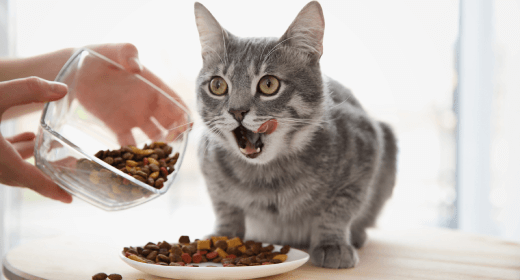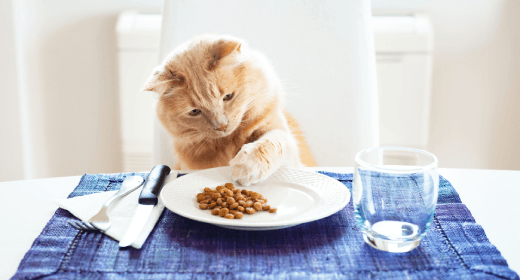

Taurine is an important component to all IAMS™ cat foods, such as IAMS ProActive Health™ Adult Original with Chicken.
Taurine is an essential amino acid that is critical for normal heart muscle function, vision, and reproduction in kittens. It is also needed to form the bile salts that aid in digestion. Unlike other amino acids, taurine is found as a free amino acid in body tissues such as the heart and eyes and is not incorporated into proteins
Most mammals manufacture taurine from other amino acids. However, cats cannot manufacture enough and, therefore, must acquire enough additional taurine through diet to meet their needs. In pet food, taurine is naturally found in animal-based protein ingredients and can also be added separately.
Taurine helps in maintaining normal vision, heart muscle function, digestion, normal pregnancy and fetal development, and a healthy immune system. Taurine for cats can only be found in animal-derived proteins.
Taurine can be made by dogs from two other amino acids: cysteine and methionine. As a result, it isn't regarded necessary in their diet. But since taurine is an important ingredient, you can add it to your pet’s diet due to its numerous health benefits.
Taurine criteria for commercial dog food have yet to be established. If you are worried that your dog may have inadequate taurine or if you need guidance on how much taurine to include in your dog's diet, it is best to consult your veterinarian.
It is vital to include taurine in your cat’s food because cats cannot synthesize it. If your cat's food has too little taurine, it will become taurine deficient, which can lead to a range of major health concerns. For example, taurine could cause your cat’s retinas to degenerate and make your pet go blind. Further, this lack of taurine can stifle growth and make it difficult for you cat to reproduce.
Therefore, the minimum taurine requirement for adult cats in commercial pet food is 25mg/100 kcal for dry food and 50mg/100 kcal for canned foods, according to the Association of American Feed Control Officials Publication, 2018. However, because taurine requirements vary from one cat to the next, it's always a good idea to check with your vet if you're concerned that your pet isn't getting enough.
IAMS dry cat foods also include taurine as an ingredient to supplement the primary source of this amino acid, which is animal-based protein from sources such as chicken, egg, lamb, and fish. However, these sources can vary in their taurine content, and adding more taurine is a sound approach to ensure optimal taurine levels.Ü
Health benefits of Taurine
Taurine is an amino acid found in muscles, the heart, the brain, and the retina, among other tissues and organs. Unlike most amino acids, taurine does not form cell proteins but has a variety of other functions. Here are some taurine benefits for cats:
Taurine deficiency can cause serious health problems for your cat over time because it is required for many regular metabolic functions. Some of the issues include:
IAMS cat foods are formulated with high-quality, animal-based proteins as their primary ingredient. In addition, they are supplemented with extra taurine to ensure balanced levels of essential amino acids.
IAMS Proactive Health Healthy Adult with Chicken and Salmon are one of the best foods to feed your cat. This nutrient-dense cat food is available in chicken and salmon flavors. These food ingredients act as the first ingredient to promote a healthy body for play. It also contains natural fiber and prebiotics, which help your cat's digestion. What’s more is that it helps your cat develop strong muscles with rich amounts of protein and provides a complete and balanced diet with no fillers.
Taurine has no significant side effects and is well-tolerated by cats when added correctly. The only side effect reported is minor vomiting which is lessened by providing a supplement with food.
In the late 1980s, taurine was discovered to be an essential component of a cat's diet. Since then, all cat foods have been enriched with plenty of taurine to suit their individual demands.
A high number of cats given unfortified commercial foods suffer from taurine insufficiency. Because cats can't absorb all of the taurine in processed foods and/or can't synthesis the difference between absorption and demand, taurine is considered an essential amino acid for cats.


Author: Dr. Siti Zaenab
Most owners understand that protein is one of the key nutrients that cats need to thrive and stay healthy, but what many may not fully realize is just how important it is for their long-term wellbeing. Protein is a cat’s primary energy source, and cats need more protein than other domestic animals like dogs and even people. In order to fuel their bodies and nervous systems, cats require more than 50% of their dietary calories to come from protein.
Cats then break the protein down into 11 specific amino acids, which are also known as essential amino acids, which are not found in cats’ natural systems. These essential amino acids are the building blocks that create new proteins and make glucose for energy. On the other hand, amino acids that are found within cats’ natural systems are called non-essential amino acids, and these are not required in a cat’s diet.
A cat’s diet requires animal protein that contains all the essential amino acids that cats need but are not found in plant proteins. This aligns with the understanding that cats are obligate omnivores, needing meat-based protein to survive.
The slightest deficiencies in any of the essential amino acids can lead to serious health problems for cats. For instance, taurine deficiency can cause a host of problems such as blindness, inadequate immune response, poor growth and poor reproductive function.
Another essential amino acid, arginine, is important to remove ammonia from the cat’s body through urine. Without sufficient arginine content in a cat’s diet, ammonia can build up in the bloodstream, which is toxic for the cat. Additionally, the essential amino acid histidine, is a structural protein that acts as a precursor to a number of neurological compounds such as histamine. Histidine deficiency can result in weight loss, refusal to eat, and may result in cataracts.
Cats can consume their dietary protein and obtain their essential amino acids through animal products like chicken and fish. Chicken has one of the highest biological values of all the meats, making it an excellent protein source for cats. It is also a good source of tryptophan, calcium, potassium, and vitamin B6. Fish is also a highly digestible protein source, and fish like salmon can provide cats with important omega-3 fatty acids.
While natural food options that somewhat fulfil a cat’s protein needs are available, owners these days go the extra mile to deep-dive into research to ensure better lives for their cats. Besides relying on online sources like the Internet, cat owners are also seeking more counsel from vets about their beloved cats’ needs, while also becoming more selective in their decisions and detailed in their questions, which is very encouraging to see as a vet. With this spirit, owners can better understand that their cats require adequate protein to stay healthy.
Along with veterinary guidance, owners are on the look-out for food solutions that contain all the essential protein contents in one place. We are finding that they are increasingly turning to products like IAMS products, which contain protein necessary for a variety of needs, such maintaining a healthy coat, strong muscles, and good digestion. With IAMS products, cats can get their protein needs from chicken with IAMS Healthy Adult with Chicken, with real chicken as its main ingredient, and from fish with IAMS Healthy Adult with Ocean Fish, with real fish as its main ingredient, both aiding in healthy digestion, skin and coat, teeth, and muscles, to name a few.
Owners must ensure that their cats’ diets provide complete and balanced nutrition, a key component of which is adequate protein. This can be achieved through consulting with vets, researching good protein sources, and sharing knowledge with fellow cat owners, among others. With such a concerted effort, cat owners can be assured about keeping their cats as healthy and happy for as long as possible.